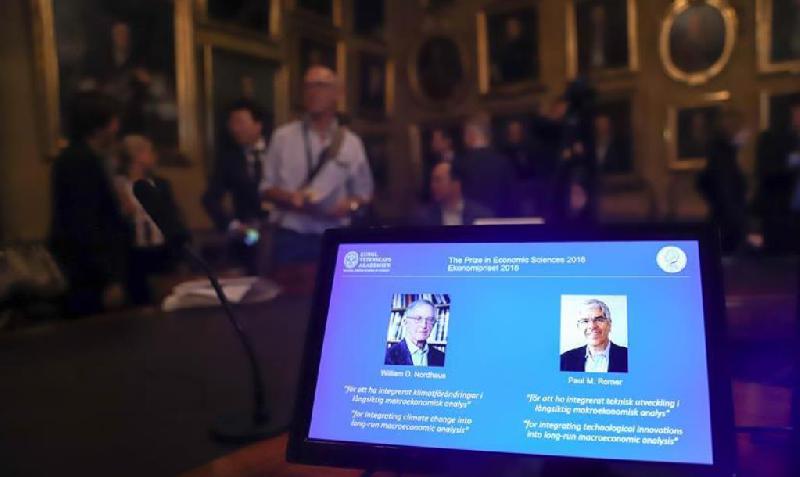
Jiangmin Xu, assistant professor in Finance, Guanghua School of Management at Peking University, shares with China Fortune Media his insights into the theories of two American economists, William D. Nordhaus and Paul M. Romer, who were awarded this year's Nobel Prize in Economic Sciences on Monday.
Why are they the winners of the Nobel Prize in Economic Sciences this year?
Sustained and sustainable economic growth is one of the most important economic development goals for many countries around the world. But in today's world, countries are faced with two difficult problems in achieving this development goal. One is the general slowdown of global economic growth, the other is the worsening of global warming. William D. Nordhaus and Paul M. Romer's award is timely, since their research specifically addresses these two problems. Nordhaus studies how climate change and global warming interacts with economic growth, while Romer studies how knowledge can function as a driver of long-term economic growth. Their research provides very useful guidance on reducing the problem of global warming and at the same time, achieving faster and sustainable economic growth.
What guidance do their theories provide on helping China's economic and financial development?
The usefulness of their theory and research for our economic growth and financial investment can be summarized as follows. First, their research allows us to evaluate how to guide our economy towards emission levels that properly balance societal costs and benefits and to develop better climate policies for our economy. Second, their research gives guidance on how to better design policies, such as R&D subsidies and patent regulation, so that ideas-driven growth can be sustained over time. Third, from an investment prospective, their research teaches investors how to manage climate change risks, and how to invest in companies and industries that are not only profitable but also produce knowledge and ideas which are beneficial for the long-term development of our society as a whole.
Explain their theories in an understandable fashion?
William D. Nordhaus incorporates global warming into traditional economic growth analysis. Nordhaus pioneered the development of integrated assessment models (IAM). His quantitative models describe the global interplay between the economy and the climate, which integrate theories and empirical results from physics, chemistry and economics. The models are very helpful in examining the consequences of climate policy interventions, such as carbon taxes.
Paul M. Romer pioneered the development of endogenous growth theory. In earlier economic growth models, technological advances are assumed to flow in from external sources outside the market place. In Romer's theory, he shows how ideas and innovations for new goods and services can be created in the market economy. He also demonstrates how such endogenous technological change can shape growth, and which policies are necessary for this process to work well.
What is the contribution and innovation of Professor Nordhaus' theory?
Global warming is a long-standing problem for countries around the world. Using qualitative analysis, we can see that global warming and climate change bring natural disasters to our society, causing economic damages on various fronts. Hence global warming produces negative effects on economic development. However, in traditional economic growth analysis, there is no systematic and quantitative research on how global warming and climate change could affect economic growth. Qualitative analysis cannot tell us how much damage would be done to our economy and future economic growth due to global warming. William D. Nordhaus addressed this exact problem by pioneering the development of integrated assessment models (IAM), which study how climate change and global warming interacts with economic growth from a quantitative perspective. These models help policy makers measure the potential economic damage of global warming and design better policies to manage the risks of climate change. A prominent example is the US government's policy responses to natural disasters caused by hurricanes and floods that are potentially due to climate change. Since our country is prone to natural disasters such as droughts and typhoons, my research also studies climate change problems and their financial impacts in China. Drawing important ideas from the IAM of Nordhaus, I have collaborated with the Agricultural Development Bank of China in examining how agricultural policy loans could help agricultural firms manage the impact of climate change and maintain sustainable growth under the impact of global warming.
Jiangmin Xu is Assistant Professor in Finance from Guanghua School of Management at Peking University. He received his B.A. in Economics with First Class Honor from University of Cambridge in 2008, and his Ph.D. in Economics from Princeton University in 2014. His dissertation committee include Professor Yacine Ait-Sahalia (the founder of Benheim Center in Finance at Princeton University), Professor Harrison Hong (Fisher Black Prize Winner in 2009) and Professor Christopher A. Sims (Nobel Prize in Economics in 2011). He had publications in Top Finance and Economics Journals including Journal of Financial Economics and Journal of Econometrics. He is the winner of best paper award in 2017 in China International Conference in Finance. He had presented his papers in various top international conferences in finance and economics every year, including American Finance Association Annual Meeting, European Finance Association Annual Meeting, China International Conference in Finance, Asian Meeting of Econometrics Society and the Annual Conference in Development at World Bank Headquarter.


















Latest comments